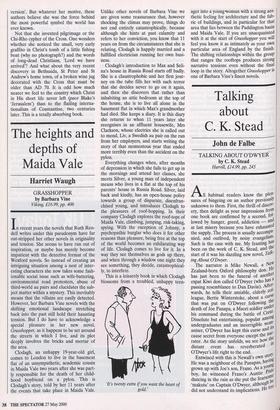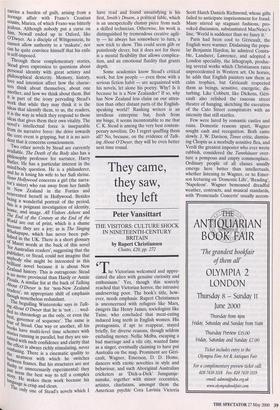Talking about C. K. Stead
John de Falbe
TALKING ABOUT O'DWYER by C. K. Stead Harvill, £14.99, pp. 245 All habitual readers know the plea- sures of bingeing on an author previously unknown to them. First, the thrill of discov- ery, then delight as your impressions frail one book are confirmed by a second, fol- lowed by hunger, greed, addiction — and, at last misery because you have exhausted the supply. The process is usually accomPa" vied, and outlived, by noisy evangelistn. Such is the case with me. My feasting has been on the work of C. K. Stead, and the start cif it was his dazzling new novel, Talk- ing About O'Dwyer. The narrator is Mike Newall, a N!...v.'? Zealand-born Oxford philosophy don. tle has just been to the funeral of another expat Kiwi don called O'Dwyer (who has 3 passing resemblance to Dan Davin). After- wards, he tells their amiable, elderly col- league, Bertie Winterstoke, about a curd that was put on O'Dwyer following Zr death of Joe Panapa, a Maori soldier uncle', his command during the battle of Crete. Dissolute but entertaining, popular amok undergraduates and an incorrigible mot aniser, O'Dwyer has kept this curse and cause secret from everyone except the 1131 rator. As the story unfolds, we see how t," distant event has reverberated O'Dwyer's life right to the end. Entwined with this is Newall's own sta/. He was a neighbour of the Panapas, having grown up with Joe's son, Frano. As a y01:1!eg boy, he witnessed Frano's Auntie POe dancing in the rain as she put the fearsome `makutu' on Captain O'Dwyer, although '0 did not understand its implications. He t° carries a burden of guilt, arising from a teenage affair with Frano's Croatian Marica, of which Frano was bitterly jealous. Although nobody put a curse on Newall ended up in Oxford, like O'Dwyer. As a disciple of Wittgenstein, he cannot allow authority to a `makutu', nor can he quite convince himself that his exile is self-imposed. Through these complementary stories, Stead gives expression to questions about Personal identity with great artistry and Philosophical dexterity. Memory, history, love and intention affect how the charac- ters think about themselves, about one another, and how we think about them. But it is part of the irony pervading Stead's work that while they may think it is the ideas that identify them, to us, the readers, it is the way in which they respond to those ideas that gives them their own vitality. The novel's intellectual force is inseparable from its narrative force: the drive towards the core event is gripping, but it is no acci- dent that it concerns consciousness. Two other novels by Stead are currently available. The Death of the Body also has a Plillosciphy professor for narrator, Harry Butler. He has a particular interest in the Mind/body question. He is a philanderer, and he is losing his wife to her Sufi shrine. Sister Hollywood concerns a girl (the narra- tor's sister) who ran away from her family m New Zealand in the Forties and reinvented herself in Hollywood. Besides being a wonderful portrait of the period, home, is a poignant investigation of identity, "orrie, and image. All Visitors Ashore and The End of the Century at the End of the because are out of print, which is a shame because they are a joy; as is The Singing 1,'?hakapapa, which has never been pub- lished in the UK. There is a short glossary of Maori words at the back of this novel for Australian readers', suggesting that the Publisher, or Stead, could not imagine that ballYbody else might be interested in this Zealand novel because it is about New 4-ealand history. This is outrageous: Stead ps no more provincial than Hardy or Annie 4rb°11b1. A similar list at the back of Talking readers', O'Dwyer is for `non-New Zealand ti'ers', an appropriate shift of emphasis Tigh nonetheless redundant. in h,e beguiling Winterstoke says in Talk- d About O'Dwyer that he is 'not . . . wed- b`!.d to chronology as the only, or even the t,csr, governor of sequence'. The same is b'e of Stead. One way or another, all his stories have multi-level time schemes with ta`1ries running in parallel, but they are sus- t:ed with such confidence and clarity that eirn f,.effect is always richly stimulating, never the.—shlg. There is a cinematic quality to be, neatness with which he switches lustframes. But his structures are not jiZY or unnecessarily experimental: they sto:eem the best way to tell a complex la lie makes them work because his Itage is crisp and clean. only one of Stead's novels which I have read and found unsatisfying is his first, Smith's Dream, a political fable, which is an unexpectedly clumsy piece from such a skilled technician. Otherwise, his work is distinguished by tremendous creative agili- ty — he always has somewhere to turn, a new trick to show. This could seem glib or pointlessly clever, but it does not for there is a mental flexibility that allows complica- tion, and an emotional fluidity that grants depth.
Some academics know Stead's critical work, but few people — even those with a serious fiction habit — are acquainted with his novels, let alone his poetry. Why? Is it because he is a New Zealander? If so, why has New Zealand less claim on our atten- tion than other distant parts of the English- speaking world? Ranking writers is an invidious enterprise but, fresh from my binge, it seems incontestable to me that C. K. Stead is among the very best contem- porary novelists. Do I regret quaffing them all? No, because, on the evidence of Talk- ing About O'Dwyer, they will be even better next time round.



































































 Previous page
Previous page